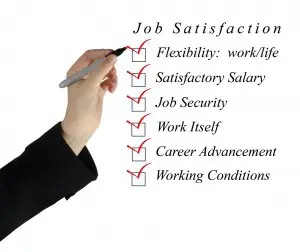 The great short story writer, Flannery O’Connor, once wrote that a good man is hard to find – and the same goes for good employees. Once you find a group of employees who work efficiently, think creatively and have your company’s best interest in mind, you’ll want to keep them around for as long as possible. But in today’s world of limitless choices and economic unease, keeping your staff engaged is important. If you find yourself – and your staff – feeling uninspired, incentive programs can help.
The great short story writer, Flannery O’Connor, once wrote that a good man is hard to find – and the same goes for good employees. Once you find a group of employees who work efficiently, think creatively and have your company’s best interest in mind, you’ll want to keep them around for as long as possible. But in today’s world of limitless choices and economic unease, keeping your staff engaged is important. If you find yourself – and your staff – feeling uninspired, incentive programs can help.
Turnover Hurts
Too many companies are allowing themselves to become a revolving door; that is, keeping people on a short-term basis and simply training another short-term employee when the previous one leaves. The problem with that cycle is not only the expense but also the reputation it gives the company to the outside world and to the folks who work there. Other more tangible costs to the company include the following:
- Termination and hiring administrative costs
- Employment advertising
- Employee pre-screening
- Interviewing
- Assessment testing
- Background checks
- Formal and informal training time
- A new employee’s learning curve
Of course, this is not a comprehensive list, and costs may differ for your company. The important thing to remember, however, is that these costs often total up to much more (especially in repetition) than implementing a few employee incentive programs for your existing staff.
Employee Incentive Ideas
Keeping your employees engaged is the key to mitigating turnover. Incentive programs can reward employees, make them feel appreciated and encourage them to stick around.
Telecommuting or flexible hours
One low-cost option is rewarding your employees by allowing them to work a more flexible schedule or the option to work from home. If your employees are commuting a fair distance to the office or have family members at home who need attention (such as young children or elderly relatives), this is particularly appealing.
Health and wellness opportunities
Even if your company offers basic health insurance to employees already, a group membership rate to a gym, health club or fitness class is a perk that goes a long way. Your team members could also consider participating in an intramural sport such as kickball or softball as a way to enrich good relationships outside of the office.
Production-based bonuses
You cannot go wrong with production-based bonuses – and they don’t have to amount to much. Employees want to feel rewarded for their efforts, and setting up a system in which your team members receive a certain percentage of a sale or a small bonus for extra projects can go a long way. No need to break the bank with these bonuses; in fact, you’ll probably notice that employees respond enthusiastically at the chance to engage in friendly competition, either against each other or against their own previous efforts.
Social events
Remember when you were a kid and the teacher threw a pizza party when things went well in the classroom? The same idea applies to adults. Scheduling events where your employees can kick back and enjoy socializing with each other are as useful as ever. An occasional lunch or dinner out on the town is a fun way to boost morale in the company and show your employees that you value them as people, not just as worker bees.
Learning opportunities
A slightly more expensive option might be to offer tuition reimbursement or educational opportunities to your employees. Many employees would like to continue education but cannot afford to do so. Ongoing training opportunities can help employees gain confidence, which can lead to better performance.
Paid time off and sick days
Another option is to offer your best employees extra sick days, mental health days or vacation days for above-average performance. Paid holidays or holidays off are also valuable.
Remember, your company doesn’t need to shed a large amount of money to keep employees feeling engaged and appreciated. While raises are always welcomed, employee incentive programs are a useful alternative in tougher economic times, and they let your team members know that the company needs their talents and abilities in the long run – not just temporarily.
Anton Pomakov is the Senior Vice President for Marketing at Dallas-based Silverleaf Resorts where he manages marketing development, operations and business growth initiatives. He has spent his entire career as a professional in the hospitality industry, leading marketing and management teams with a goals-based approach to improving customer experience and the bottom line. Follow Anton and Silverleaf Resorts on Twitter @SLResorts or on LinkedIn.
Image Credit: Shutterstock.com




